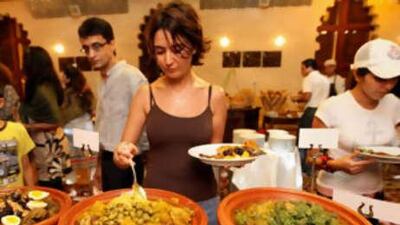DUBAI // Tonnes of food thrown away after brunches and buffets will now be given to the poor. Food wasted at parties, weddings, restaurants and common kitchens will now be collected and distributed among the less fortunate by a food recovery programme, municipal officials said yesterday.
Authorities say tonnes of healthy food go uneaten in the UAE every week, and that they are now co-ordinating with public and private enterprises to prevent it from rotting needlessly. "Even in a society where just about everything is disposable, good food going to waste is unacceptable. This situation calls for us to act immediately," said Khalid al Awadhi, the director of food control for the municipality.
Major food companies, hotels, restaurants and supermarkets have already been approached by municipal officials about taking part in the programme. Welfare groups have also been contacted. Perishable produce from shops and prepared foods from restaurants are to be collected, as well as items kept aside by supermarkets due to faulty labelling. Officials insisted that only unspoilt food would be distributed.
"We will be serving only safe food to the people in need and the food control department will take all measures to ensure that food is collected and served safely. The organisations who wish to collect perishable, cooked foods must have proper storage and transportation facilities," said Mr Awadhi. The programme would also provide guidelines for the collection and distribution of food and train those involved. The companies and welfare groups taking part will register with the municipality so that they can be monitored constantly.
The organisers said they aimed to recover at least 20 per cent of the food currently being wasted. "A lot of it will still be wasted but we hope we can recover more and more in time," said an official at the food control department. Food banking systems already exist in the US and Europe but officials said Dubai's programme would notably have to overcome space constraints. The National has reported that hungry people in Abu Dhabi were collecting expired food from rubbish bins to feed their families due to the global phenomenon of soaring food prices.
Dubai Municipality said the city imported about 85 per cent of its food and admitted that an enormous amount was wasted. "Nearly 20 per cent of food goes to waste in households, commercial kitchens, markets and restaurants," said Mr Awadhi. He added that the rising food prices had sparked renewed interest in food security. The Food and Agriculture Organisation estimates that every 30 seconds a child dies of hunger and that every day 25,000 people die of malnutrition.
"In this context, what each country and each individual does is vitally important, but even more important is what we do together," he said. The UAE's hotels are well-known for their lavish buffets. Municipal officials said they had approached some leading companies about the project, and that some, including the Dubai World Trade Centre and Hyatt International, had already agreed to take part. Thierry Bertin, of Hyatt International, said: "We have had a lot of food left over in the past. This is a brand new project and we welcome it. We hope to listen, contribute and work in tandem with Dubai Municipality."
He added: "It is very important for us that any procedure [for collecting food] matches our hygiene standards and requirements." Food companies, charities or anybody else who would like to help with the programme can call the food control department on 04 206 4211. @Email:pmenon@thenational.ae gmcclenaghan@thenational.ae

